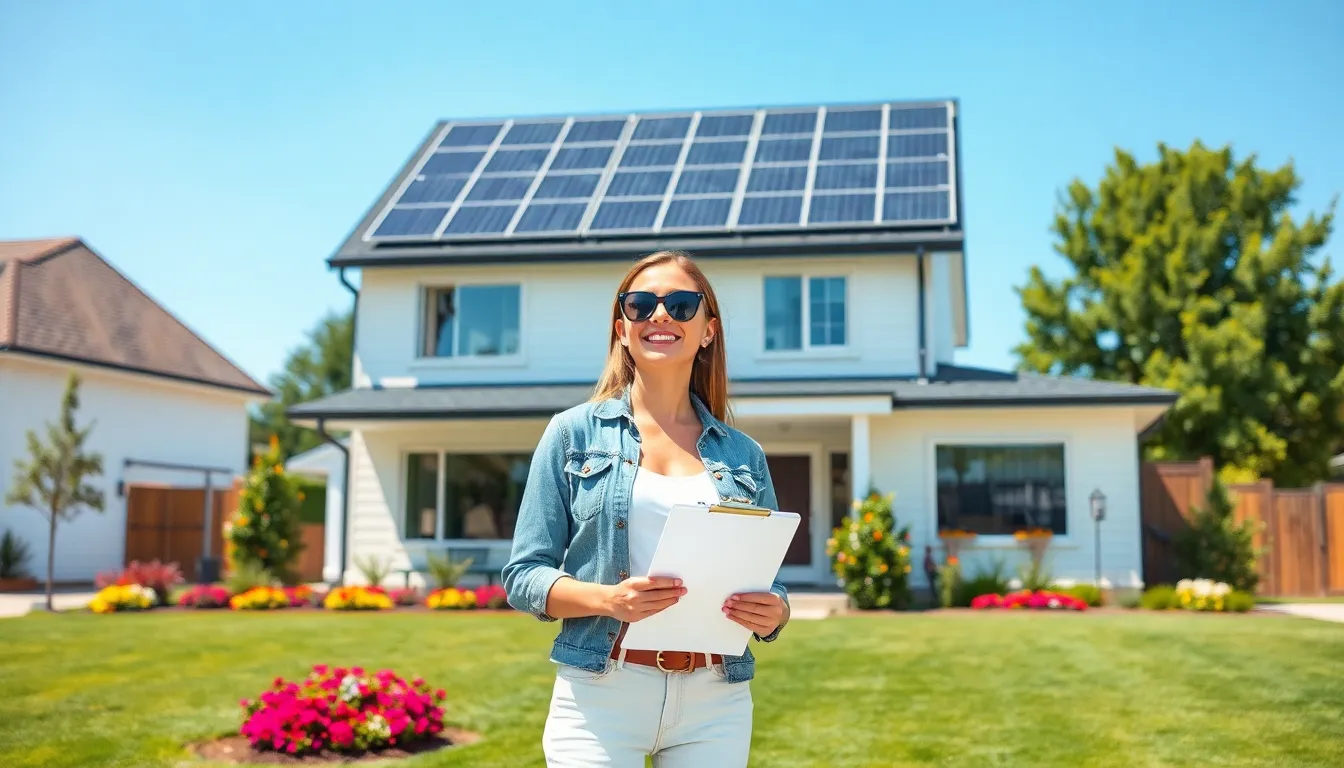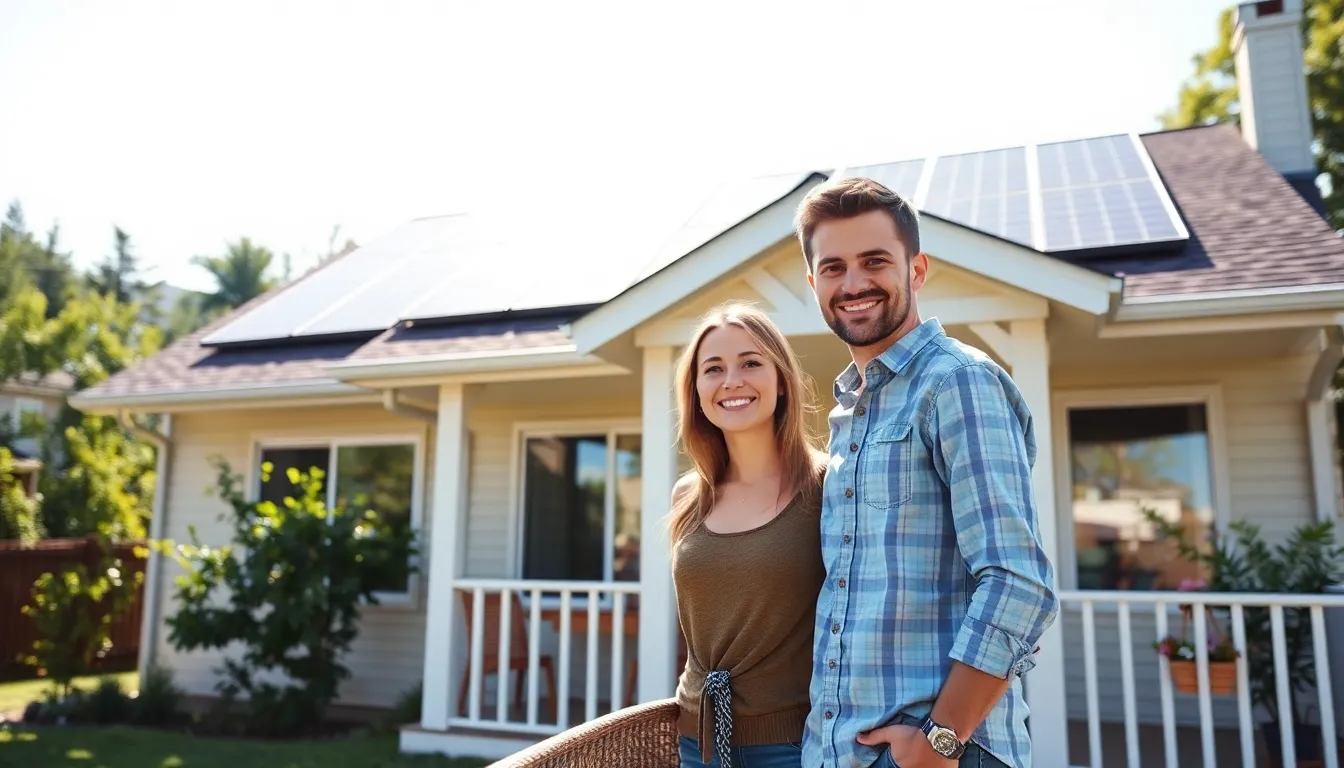Table of Contents
ToggleIn a world where energy bills seem to have a life of their own, the battle between renting and buying a home with solar panels heats up. Imagine basking in the sun while your neighbors are sweating under the weight of their electric bills. It’s not just about saving money; it’s about embracing a lifestyle that’s as green as your favorite smoothie.
Whether you’re a renter dreaming of a sun-soaked balcony or a buyer eyeing that perfect eco-friendly abode, the choice can feel overwhelming. Should you dive into homeownership or stick to the carefree life of renting? With solar panels shining a light on both paths, it’s time to weigh the pros and cons. Get ready to explore the sunny side of real estate and discover which option might just be your ticket to energy independence and financial freedom.
Overview of Solar Energy in Real Estate
Solar energy plays a significant role in real estate, influencing home buying and renting decisions. Many buyers and renters now prioritize sustainability, aiming to reduce energy costs while promoting eco-friendly living. Solar panels provide a means for homeowners to generate their own electricity, resulting in lower utility bills.
In residential properties, the installation of solar panels enhances home value. According to the National Renewable Energy Laboratory, homes with solar energy systems sell for approximately 4.1% more than comparable homes without solar. This increase appeals to environmentally conscious buyers and contributes to a property’s resale value.
Renters increasingly seek out properties featuring solar installations. Landlords recognize this trend and may invest in solar technologies to attract more tenants, ultimately enhancing their return on investment. A property equipped with solar panels can generate additional income for landlords, as reduced energy costs can justify higher rent prices.
Financial incentives drive solar energy adoption in real estate. Tax credits and rebates, such as the federal solar investment tax credit, encourage homeowners and investors to reduce initial installation costs. These incentives contribute to the financial viability of solar technologies, making them an attractive option for new homeowners.
Energy independence is another consideration that influences consumer decisions. Solar panels allow residents to rely less on utilities, providing more control over their energy consumption and expenses. As climate awareness grows, solar energy’s role in real estate continues to gain traction. This increased focus on renewable energy will likely shape future housing market trends, making solar-equipped homes more desirable.
Advantages of Renting Homes with Solar Panels

Renting a home with solar panels offers unique benefits. These homes provide a modern approach to energy consumption.
Cost Savings and Flexibility
Significant cost savings stem from reduced electric bills. Renters start enjoying these savings immediately without worrying about installation costs. Flexibility remains a key advantage as renters can relocate more easily than homeowners. They avoid long-term commitments associated with purchasing property. The enhanced resale value of solar-equipped homes averages around 4.1%, but renters reap immediate benefits without the ongoing financial investment in property. Incentives like tax credits and rebates frequently apply to landlords, resulting in lower utility costs for tenants. Financially, renting may provide a more attractive option, especially for those prioritizing sustainability.
Maintenance and Upkeep
Maintenance responsibilities decrease substantially for renters. Landlords often handle upkeep and repairs, allowing tenants to focus on enjoying their homes. Solar systems typically require minimal maintenance, and most come with warranties covering performance and repair. As a tenant, the burden of managing repairs falls on the property owner. This arrangement allows renters to benefit from solar technology without the hassles of ownership. Access to updated solar technology also remains a draw, as landlords upgrade systems to enhance efficiency. In essence, renting homes with solar panels translates to convenience and cost-effectiveness, removing the worries associated with homeownership burdens.
Advantages of Buying Homes with Solar Panels
Purchasing a home with solar panels presents numerous benefits that attract buyers.
Long-Term Investment Value
Solar-equipped homes significantly enhance investment potential. A property with solar panels sells for approximately 4.1% more than similar homes lacking them. These energy systems can increase overall home resale value over time, making them a financially savvy choice. Buyers can save thousands on utility bills, realizing substantial returns over the years. Moreover, long-term energy savings often offset the initial cost of installation, leading to a more favorable cost-benefit ratio for homeowners. As energy prices continue to rise, owning a home with solar panels remains an advantageous financial decision.
Energy Independence
Energy independence becomes achievable with a home equipped with solar panels. Homeowners can generate their electricity, reducing reliance on local utility companies. This self-sufficiency allows for greater control over energy expenses. Many homeowners enjoy peace of mind knowing they can harness renewable energy regardless of fluctuating market prices. Additionally, surplus energy can often be sold back to the grid, creating potential income opportunities. Embracing solar energy not only contributes to personal savings but also promotes environmental sustainability, aligning with growing concerns about climate change.
Factors to Consider in Renting vs Buying
Both renting and buying homes with solar panels present unique considerations that influence decision-making.
Financial Implications
Renting homes equipped with solar panels typically leads to immediate cost savings. Reduced electric bills provide financial relief without the burden of installation costs. Renters often benefit from lower overall expenses, enhancing their budget flexibility. Conversely, buying offers long-term investment potential; homes with solar panels may sell for about 4.1% more than similar homes without them. This appreciation adds significant value for homeowners over time. Tax credits and rebates further incentivize solar investments, making homeownership a financially attractive option. Ultimately, understanding these financial nuances aids in making an informed decision.
Lifestyle Preferences
Renters appreciate the flexibility that comes with their living arrangement. The ability to move easily allows them to adapt to changing life circumstances without extensive commitments. Many renters also enjoy the reduced maintenance responsibilities, as landlords generally handle repairs and upkeep. Homeownership fosters a sense of permanence and stability, appealing to those seeking long-term roots. Generating personal electricity through solar panels aligns with environmental values, strengthening the desire for sustainability among buyers. Making choices based on these lifestyle preferences helps align personal goals with housing options.
The choice between renting and buying a home with solar panels ultimately depends on individual circumstances and priorities. For those who value flexibility and immediate cost savings renting might be the better option. On the other hand buyers looking for long-term investment and energy independence may find purchasing a solar-equipped home more appealing.
As the demand for sustainable living continues to grow the presence of solar panels in real estate will likely influence future housing trends. Making an informed decision requires weighing the benefits of each option against personal financial goals and lifestyle preferences. Embracing solar energy not only promotes environmental responsibility but also offers significant financial incentives for both renters and homeowners.








